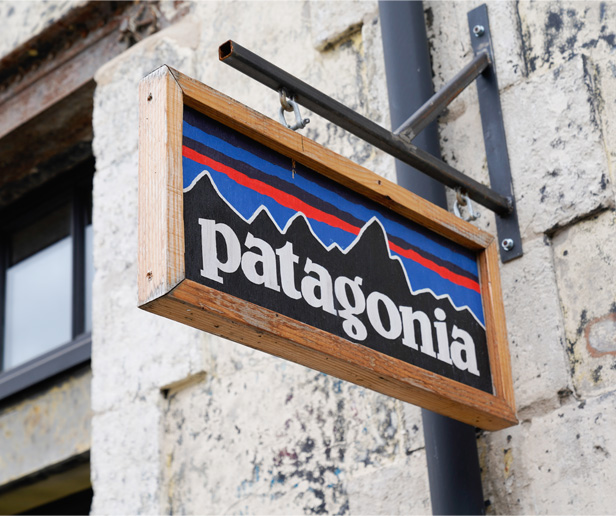Sustainability November 25, 2025
Promo Lessons From Patagonia’s Bold ‘Nothing We Do Is Sustainable’ Report
The clothing brand released its first-ever sustainability report and got candid about its progress and imperfections.
Key Takeaways
• Patagonia released its first detailed sustainability report, openly acknowledging contradictions in its environmental efforts and declaring that “nothing we do is sustainable.”
• The report highlighted progress such as eliminating “forever chemicals” and increasing use of preferred materials, while also noting challenges, including a 2% rise in emissions and limited end-of-life solutions for its products.
• Many experts praised the brand’s candid transparency, though some cautioned that bold messaging could obscure the need for clearer action on issues like overproduction and carbon reduction.
Earlier this month, Patagonia released its first-ever detailed sustainability report. It was a little surprising that the popular clothing company, which once made waves in promo for disallowing direct co-branding on its apparel for several years, had never released such a report.
(Consider that nearly one-third of Counselor Top 40 companies release annual sustainability reports, in an industry that has sometimes been derided as being behind the times when it comes to reducing environmental impact. And plenty more smaller companies in our industry have been releasing their own reports, as well. But I digress.)
What was even more surprising, perhaps, was the messaging Patagonia used in its “(Work in) Progress” report. In a marketing email announcing the report to customers, the company asked, “Are we a paradox?” The brand noted that it’s “knee-deep in contradictions,” explaining that though it runs the largest repair center in North America (through its Worn Wear program), about 85% of its products lack an end-of-life solution. In addition, Patagonia said that while it has nearly eliminated the use of virgin fossil fuels in products, some of the factories that make its gear still run on coal.
The company got even blunter within the pages of the report itself, putting it out there in an unmissable large headline font: “Nothing We Do Is Sustainable.”
In addition to the candid language, Patagonia shared data on how many of its goals it had met and which were still out of reach. Among the highlights from the report:
- Patagonia’s footprint rose 2% in fiscal 2025, to 182,646 metric tons of carbon dioxide equivalent. The brand attributes the rise to “more carbon-intensive” materials in new duffels and packs.
- The brand says it has eliminated “forever chemicals” from its fabrics.
- Patagonia has reached 84.4% of its goal of buying materials from preferred sources with reduced climate impacts, particularly through the use of recycled polyester and nylon.
- Just 1% of the products Patagonia has made have been returned to the company for recycling, and only 20% of those returned can be processed. The rest are being stored indefinitely until the brand can figure out what to do with them.
But it’s that overall message – declaring its actions as unsustainable – that’s most memorable, and certainly what the media (myself included) have latched onto. It leaves me wondering whether Patagonia’s report is a refreshing and necessary breath of fresh air among all-too-prevalent corporate greenwashing, or just another gimmick that’s not really moving the conversation on social and environmental impact forward.
I posed the question to my Promo for the Planet Editorial Advisory Board, and as always, they had insight to share. “Patagonia’s messaging is catchy, but it risks giving consumers the impression that the company is doing all that it can on key issues like carbon emissions and overproduction,” said Lindsey Cole, director of marketing and communications at Ethix Merch (asi/189731). “I would prefer to hear about the concrete steps they are taking, rather than initiatives that feel impossible to achieve, and shift the focus to that. Still, it’s encouraging to see campaigns that highlight the complexities of sustainability in the apparel industry and spark meaningful conversations about it.”
Overall, Patagonia has been receiving praise for creating a highly readable and engaging impact report that’s forthright about its shortcomings, while remaining resolute about future efforts.
For example, Denise Taschereau, CEO and co-founder of Vancouver-based B Corp Fairware (asi/191452), noted on LinkedIn that “if business is going to be a force for good, we need more brands like Patagonia that are bold enough to show the messy parts and strong enough to keep pushing.”
Taschereau added that Fairware is proud to be a wholesale partner for Patagonia, noting that the company’s “commitment to transparency, durability, ethical sourcing and a planet-first mindset echoes Fairware’s own purpose.” The report reaffirmed the distributor’s commitment to choosing partners that don’t just talk about sustainability, but also report on it.
Indeed, the report – and the reactions to it – hold several lessons for the promo industry as it continues its journey toward sustainability. Here are three takeaways:
- Radical transparency builds trust. Being open about failure, and sharing a detailed roadmap of how you plan to address those failures, goes a much longer way than merely sharing success stories.
- Storytelling matters, but only if it’s backed with real metrics. Patagonia told a compelling story with its report, complete with striking visuals, but it also shared concrete data about its footprint and recycling efforts.
- Quality is an environmental strategy. Patagonia’s report emphasizes durability, repairability and multifunctionality of products. While using preferred or recycled materials is important, the key is that recipients want to keep and use an item long-term – and that a promo product is built to last.
As the next wave of sustainability reports get released in 2026, it will be interesting to see how many brands take Patagonia’s example to heart.

Promo for the Planet is your destination for the latest news, biggest trends and best ideas to help build a more sustainable and socially-responsible industry.

